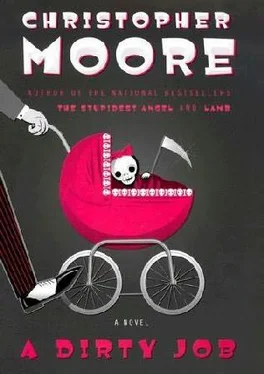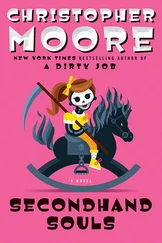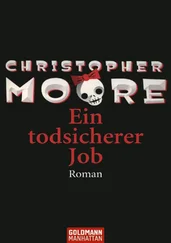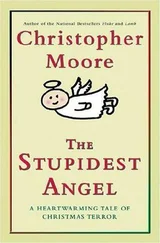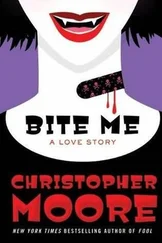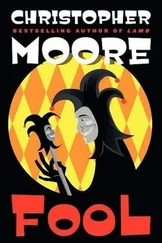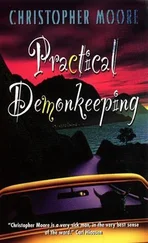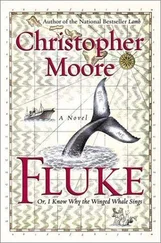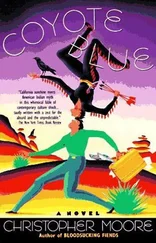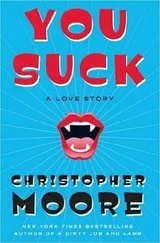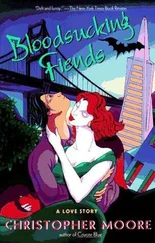“You’re doing fine,” Jane said. “Nobody’s good at this.”
“What the fuck’s a shivah?”
“I think it’s that Hindu god with all the arms.”
“That can’t be right. The Goldsteins are going to sit on it with me.”
“Didn’t Rachel teach you anything about being Jewish?”
“I wasn’t paying attention. I thought we had time.”
Jane adjusted baby Sophie into a half-back, one-armed carry and put her free hand on the back of Charlie’s neck. “You’ll be okay, kid.”
Seven,” said Mrs. Goldstein. “ Shivah means ‘seven.’ We used to sit for seven days, grieving for the dead, praying. That’s Orthodox, now most people just sit for three.”
They sat shivah in Charlie and Rachel’s apartment that overlooked the cable-car line at the corner of Mason and Vallejo Streets. The building was a four-story brick Edwardian (architecturally, not quite the grand courtesan couture of the Victorians, but enough tarty trim and trash to toss off a sailor down a side street) built after the earthquake and fire of 1906 had leveled the whole area of what was now North Beach, Russian Hill, and Chinatown. Charlie and Jane had inherited the building, along with the thrift shop that occupied the ground floor, when their father died four years before. Charlie got the business, the large, double apartment they’d grown up in, and the upkeep on the old building, while Jane got half the rental income and one of the apartments on the top floor with a Bay Bridge view.
At the instruction of Mrs. Goldstein, all the mirrors in the house were draped with black fabric and a large candle was placed on the coffee table in the center of the living room. They were supposed to sit on low benches or cushions, neither of which Charlie had in the house, so, for the first time since Rachel’s death, he went downstairs into the thrift shop looking for something they could use. The back stairs descended from a pantry behind the kitchen into the stockroom, where Charlie kept his office among boxes of merchandise waiting to be sorted, priced, and placed in the store.
The shop was dark except for the light that filtered in the front window from the streetlights out on Mason Street. Charlie stood there at the foot of the stairs, his hand on the light switch, just staring. Amid the shelves of knickknacks and books, the piles of old radios, the racks of clothes, all of them dark, just lumpy shapes in the dark, he could see objects glowing a dull red, nearly pulsing, like beating hearts. A sweater in the racks, a porcelain figure of a frog in a curio case, out by the front window an old Coca-Cola tray, a pair of shoes—all glowing red.
Charlie flipped the switch, fluorescent tubes fired to life across the ceiling, flickering at first, and the shop lit up. The red glow disappeared. “Okaaaaaaay,” he said to himself, calmly, like everything was just fine now. He flipped off the lights. Glowing red stuff. On the counter, close to where he stood, there was a brass business-card holder cast in the shape of a whooping crane, glowing dull red. He took a second to study it, just to make sure there wasn’t some red light source from outside refracting around the room and making him uneasy for no reason. He stepped into the dark shop, took a closer look, got an angle on the brass cranes. Nope, the brass was definitely pulsing red. He turned and ran back up the steps as fast as he could.
He nearly ran over Jane, who stood in the kitchen, rocking Sophie gently in her arms, talking baby talk under her breath.
“What?” Jane said. “I know you have some big cushions down in the shop somewhere.”
“I can’t,” Charlie said. “I’m on drugs.” He backed against the refrigerator, like he was holding it hostage.
“I’ll go get them. Here, hold the baby.”
“I can’t, I’m on drugs. I’m hallucinating.”
Jane cradled the baby in the crook of her right arm and put a free arm around her younger brother. “Charlie, you are on antidepressants and antianxiety drugs, not acid. Look around this apartment, there’s not a person here that’s not on something.” Charlie looked through the kitchen pass-through: women in black, most of them middle-aged or older, shaking their heads, men looking stoic, standing around the perimeter of the living room, each holding a stout tumbler of liquor and staring into space.
“See, they’re all fucked up.”
“What about Mom?” Charlie nodded to their mother, who stood out among the other gray-haired women in black because she was draped in silver Navaho jewelry and was so darkly tanned that she appeared to be melting into her old-fashioned when she took a sip.
“Especially Mom,” Jane said. “I’ll go look for something to sit shivah on. I don’t know why you can’t just use the couches. Now take your daughter.”
“I can’t. I can’t be trusted with her.”
“Take her, bitch!” Jane barked in Charlie’s ear—sort of a whisper bark. It had long ago been determined who was the Alpha Male between them and it was not Charlie. She handed off the baby and cut to the stairs.
“Jane,” Charlie called after her. “Look around before you turn on the lights. See if you see anything weird, okay?”
“Right. Weird.”
She left him standing there in the kitchen, studying his daughter, thinking that her head might be a little oblong, but despite that, she looked a little like Rachel. “Your mommy loved Aunt Jane,” he said. “They used to gang up on me in Risk—and Monopoly—and arguments—and cooking.” He slid down the fridge door, sat splayed-legged on the floor, and buried his face in Sophie’s blanket.
In the dark, Jane barked her shin on a wooden box full of old telephones. “Well, this is just stupid,” she said to herself, and flipped on the lights. Nothing weird. Then, because Charlie was many things, but one of them was not crazy, she turned off the lights again, just to be sure that she hadn’t missed something. “Right. Weird.”
There was nothing weird about the store except that she was standing there in the dark rubbing her shin. But then, right before she turned on the light again, she saw someone peering in the front window, making a cup around his eyes to see through the reflection of the streetlights. A homeless guy or drunken tourist, she thought. She moved through the dark shop, between columns of comic books stacked on the floor, to a spot behind a rack of jackets where she could get a clear view of the window, which was filled with cheap cameras, vases, belt buckles, and all manner of objects that Charlie had judged worthy of interest, but obviously not worthy of a smash-and-grab.
The guy looked tall, and not homeless, nicely dressed, but all in a single light color, she thought it might be yellow, but it was hard to tell under the streetlights. Could be light green.
“We’re closed,” Jane said, loud enough to be heard through the glass.
The man outside peered around the shop, but couldn’t spot her. He stepped back from the window and she could see that he was, indeed, tall. Very tall. The streetlight caught the line of his cheek as he turned. He was also very thin and very black.
“I was looking for the owner,” the tall man said. “I have something I need to show him.”
“There’s been a death in the family,” Jane said. “We’ll be closed for the week. Can you come back in a week?”
The tall man nodded, looking up and down the street as he did. He rocked on one foot like he was about to bolt, but kept stopping himself, like a sprinter straining against the starting blocks. Jane didn’t move. There were always people out on the street, and it wasn’t even late yet, but this guy was too anxious for the situation. “Look, if you need to get something appraised—”
Читать дальше
